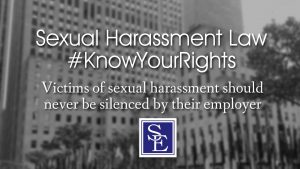On December 11, 2019 at The Hollywood Reporter’s Annual Women in Entertainment breakfast gala, Gretchen Carlson announced the formation and launch of “Lift of our Voices,” an education and advocacy organization focused on putting an end to the practice of using Non-Disclosure Agreements (“NDAs”) to silence victims of sexual harassment and discrimination. In making the announcement, Carlson was joined on stage by Charlize Theron, an actress who is portraying Megyn Kelly in the upcoming film “Bombshell,” which details the Fox News sexual harassment scandal that saw then-CEO Roger Ailes forced to resign from the company. Carlson’s sexual harassment complaint against Ailes ultimately lead to his resignation, but her settlement with Fox News, and the NDA she was required to sign to enter into that settlement, have prevented her from speaking publicly about the case.
An NDA is a contract that identifies certain information or topics that the parties agree they will not discuss with anyone following execution of the contract or agreement. NDAs typically are entered into in connection with an additional contract or agreement, such as an employment contract or a settlement or severance agreement. Often in the context of employment contracts, a prospective employee will agree not to discuss or disclose certain information regarding their employment to anyone outside the company, in exchange for being hired. In the context of settlement or severance agreements, a departing employee agrees not to discuss or disclose certain information regarding their employment or their reason for leaving the employment, in exchange for a settlement or severance payment.
In either situation, the NDA agreement can be used by the employer to facially “resolve” issues of harassment and discrimination without truly addressing systemic issues within their organization. In such a case, new prospective employees are unaware that they are entering a workplace where they may be unsafe. The public at large is likewise kept unaware, and individuals will then unwittingly support companies that they otherwise may choose not to support. Consumers are unable to apply commercial pressure to businesses that harbor and protect harassers, allowing those companies to circumvent a powerful societal check on business practices. Carlson and her organization are aiming to solve this problem, to give society at large access to this information, and more importantly, as Carlson stated, to give victims “back the voices they deserve.”
 New Jersey Employment Lawyers Blog
New Jersey Employment Lawyers Blog



